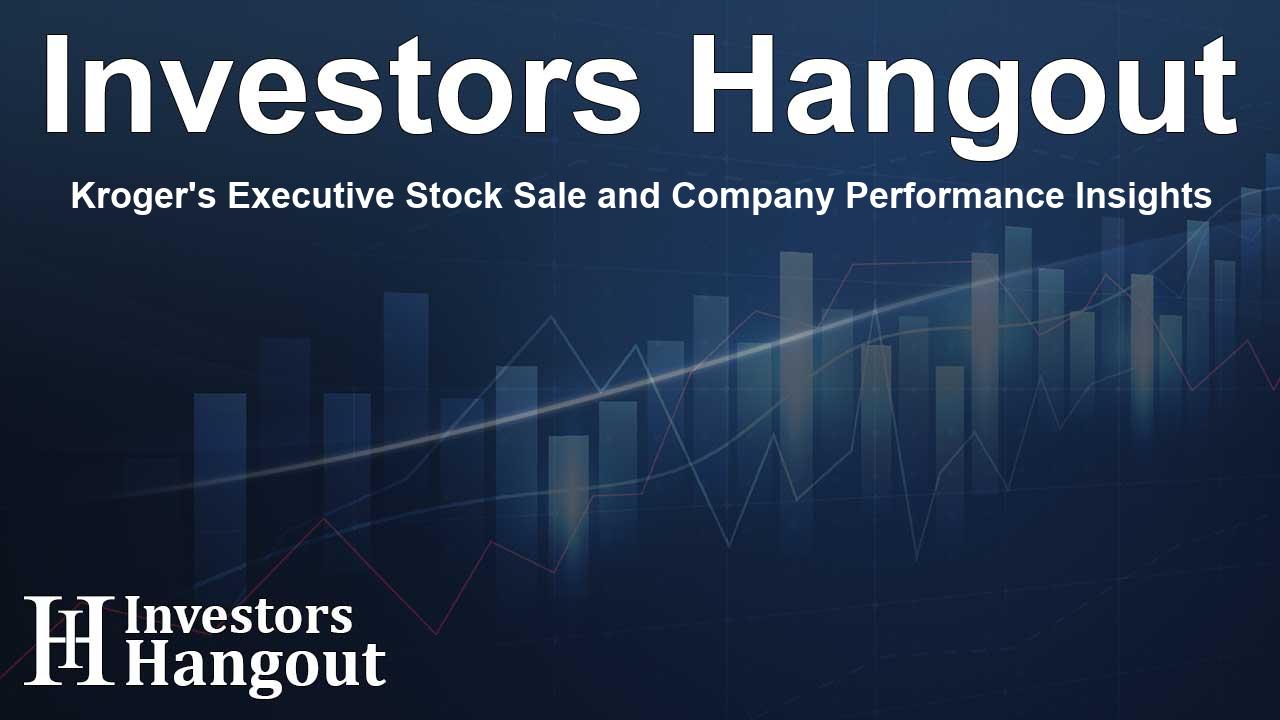Kroger's Executive Stock Sale and Company Performance Insights

Executive Stock Sale at Kroger Co.
Recently, significant movement came from within Kroger Co. When Brian W. Nichols, the Vice President and Controller, sold 4,000 shares of his stock holdings. This transaction generated nearly $222,800, based on a share price of $55.7. Following this sale, Nichols continues to hold 14,063 shares in this prominent grocery retailer.
Understanding the Context of Stock Transactions
Implications of Insider Trading
This kind of sale is part of routine disclosures that executives must make regarding stock transactions. Such filings with the Securities and Exchange Commission provide valuable insights into the actions of those at the top of Kroger's corporate structure. It’s intriguing to speculate on the reasons behind Nichols' sale, as these transactions can serve as potential clues about the company’s financial outlook.
Kroger's Market Position
Kroger Co. operates as one of the leading grocery chains in the United States and is very well-regarded amongst shareholders and analysts alike. Transactions made by executives draw particular interest, and this sale is analyzed for its implications on Kroger's financial health and market strategy.
Recent Financial Performance of Kroger Co.
In the midst of these insider activities, Kroger has displayed admirable resilience, recently reporting a modest increase in second-quarter earnings for the year. Identical sales, excluding fuel costs, saw a 1.2% increase. Additionally, digital sales enjoyed an impressive rise of 11%, and delivery solutions showcased a remarkable growth of 17%. Although adjusted earnings per share (EPS) showed a slight decrease, settling at $0.93, an improvement in the company’s gross margin rate was noted.
Kroger's Strategic Moves
Merger with Albertsons
The company's ongoing merger with Albertsons is another focal point for stakeholders. A recent offering of $10.5 billion in senior unsecured notes indicates serious financial maneuvers aimed at strengthening Kroger's position in the market. Analyses from financial institutions have shown varied opinions on the company's performance; some express cautious optimism while others focus on market pressures concerning profit margins.
Market Analyst Insights
Notably, Roth/MKM maintained a neutral rating on shares while increasing the price target to $52. In contrast, BMO Capital reaffirmed a positive outlook with an outperform rating, setting a price target of $60. Their analysis focuses on Kroger's overall gross margin resilience coupled with consistent sales momentum, painting a robust picture of potential future success.
InvestingProspects in Kroger Co.
For those keeping a close watch on Kroger's stock, it is essential to examine the broader financial landscape. Currently valued at approximately $39.67 billion, Kroger's P/E ratio sits at 18.56. Despite a modest revenue growth of 1.46%, the company's impressive track record of consecutive dividend raises—now totaling 18 years—makes it an attractive option for income-focused investors.
The dividend yield currently stands at around 2.33%, with a notable dividend growth of 10.34% over the last twelve months. Furthermore, the company's low P/E ratio in relation to its near-term earnings growth suggests potential undervaluation, underscored by a low PEG ratio of 0.2.
Conclusion and Investor Takeaway
As investors assess the implications of insiders' sales and the company's ongoing performance, Kroger Co.'s strategic developments and resilient market approach are worth noting. With compelling metrics that suggest a strong value proposition, especially in light of recent trends in earnings and market positioning, Kroger remains a noteworthy player in the grocery retail sector.
Frequently Asked Questions
What prompted Brian W. Nichols to sell his Kroger stocks?
While the specific reasons for Nichols' stock sale have not been disclosed, insider transactions are often routine and can be influenced by various personal or financial considerations.
How did Kroger's recent earnings fare?
Kroger reported a modest increase in second-quarter earnings, highlighting growth in digital sales and delivery solutions despite a slight decline in adjusted EPS.
What is the significance of the merger with Albertsons?
The merger aims to enhance Kroger's market presence and strength, with ongoing financial maneuvers, such as the recent $10.5 billion unsecured notes offering, signaling a strategic approach.
Why is Kroger's dividend history notable?
Kroger has maintained a track record of raising dividends for 18 consecutive years, showcasing its commitment to shareholder returns, which may appeal to income-focused investors.
How do analysts view Kroger's stock performance?
Analysts have mixed views, with some maintaining neutral ratings while others express optimism regarding Kroger's gross margins and sales momentum, indicating varied perspectives on its performance.
About Investors Hangout
Investors Hangout is a leading online stock forum for financial discussion and learning, offering a wide range of free tools and resources. It draws in traders of all levels, who exchange market knowledge, investigate trading tactics, and keep an eye on industry developments in real time. Featuring financial articles, stock message boards, quotes, charts, company profiles, and live news updates. Through cooperative learning and a wealth of informational resources, it helps users from novices creating their first portfolios to experts honing their techniques. Join Investors Hangout today: https://investorshangout.com/
Disclaimer: The content of this article is solely for general informational purposes only; it does not represent legal, financial, or investment advice. Investors Hangout does not offer financial advice; the author is not a licensed financial advisor. Consult a qualified advisor before making any financial or investment decisions based on this article. The author's interpretation of publicly available data shapes the opinions presented here; as a result, they should not be taken as advice to purchase, sell, or hold any securities mentioned or any other investments. The author does not guarantee the accuracy, completeness, or timeliness of any material, providing it "as is." Information and market conditions may change; past performance is not indicative of future outcomes. If any of the material offered here is inaccurate, please contact us for corrections.